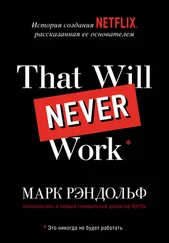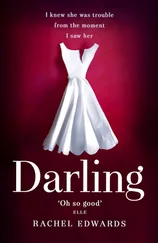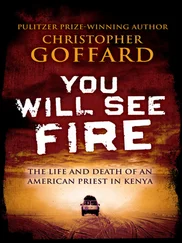“Ronald,” she cried. “You get so upset when you start with him. I wish you wouldn’t.”
“I wish I wouldn’t, too. I’d like to be free of that for once. I would like some time to live for just a little while knowing that he’s not there skulking around like some damned mangy dog. I would like to be free of him.”
“He can hear you out there,” she murmured.
“I don’t care.”
“I’m afraid of him, sometimes. I don’t know what he might do if he got angry at us.”
Dahlman threw up his hands and went off into the next room to stare out the window at the rain and the gray-sludge lake formed beyond the cattle barns. The gloom lowered over the land and the sky bled. He could not see beyond the water in the cornstalk field.
“Damn this rain,” he muttered, but loud enough for his wife to hear. “The crops are gone, ruined, and even the oats and soybeans on the hills will be finished if it rains any more. And that old bastard sits out on our porch and eats our food. Do you know what he said to me?”
“What?” she asked.
“He’s happy that there’s a flood, because he can spear carp. Now he can eat carp!”
“It can’t last much longer,” she said. “It just can’t.”
“Maybe he’ll go out there, spearing fish, and he’ll drown. Maybe his shack will wash away.” (And if Gerber lived, he would have me help him build a new shack, Dahlman added to himself.) He looked out the west window towards where Gerber’s hovel usually crouched like a beaten, bedraggled dog, but the rain hid that too. “Maybe he will drown and the shack will go, and we’ll see nothing of Gerber again.”
“He’s part river gar now,” the wife said. “He will never drown.”
Dahlman’s face grew gloomy with the thought and the rain. Outside he saw Gerber detach himself from the mudded concrete porch steps where he had eaten and move formless and black and slow across the yard, leaving great clumps of prints as he walked. At the middle of the yard Gerber turned and looked up to the house, and his face, aged and gray-yellow, mal-colored, lifted and the old eyes fell upon Dahlman, and Dahlman jerked back from the window as if he should not be there watching, and he forced himself to the window again. The ancient man in the yard dug within the bib of his overalls with their slippery black sheen, extracted a pinch or two of tobacco, hooked the tobacco and his black fingers behind his yellow lips, and the hand came away. All the while he looked at the house. And then his mouth opened a little, perhaps in a smile, perhaps to chew the tobacco, perhaps to urge the dog which stood dripping and forlorn in the middle of the yard, the dog afraid of him and hating him, yet going wherever Gerber went, to squat on his trembling, frightened haunches ten feet away and look at the foul old man who spat at him. Gerber turned and went on, creating again the ponderous prints in the yard mud, and the wet dog trailed after, delicately lifting his feet, searching his way, but the dog too growing muddy. Gerber disappeared within the corncrib. Dahlman, watching, knew what he did, knew he found his corner among the dirty empty sacks, pulled the sacks over his legs and chewed his tobacco and inhaled the dust and watched the squatting dog.
“He said he saw a snake out there on a tree,” Dahlman said softly, half to himself.
“A snake,” she said, startled, pausing in her motion in the kitchen.
“The tree was floating, he said, and the snake was on the tree.”
“Oh I don’t like that,” she said.
“It’s nothing,” he said.
“But to see a snake now, with all this rain…”
“What? You’re not superstitious, are you, Bernice? One little snake is the least of our worries.”
“But we’ve never had snakes around this place.”
“It’s nothing,” he repeated. “Gerber probably made it up, knowing it would frighten you.” He stroked his forehead. “If the rain would only stop. Then Gerber would go back to his shack; that would be better at least.”
“I hope snakes don’t come up on the yard is all,” she was saying.
“Might help clean out the mice if they did. Anyway, there’s only one and he’s stuck out there somewhere, out in this goddamn rain.”
“Don’t get upset again, Ronald,” she said, coming to him, touching him with her hand dried on her apron. “Come eat dinner, Ronald. Gerber is gone; we can eat now.”
The rain fell yet two more days out of the ragged scuds of cloud that were like black cotton clumps ripped from their box. On the fifth day after it began, the rain slowed to a warm drizzle and the drizzle was patched with rising mist, and finally broken clouds let the sun through and the heat was intense suddenly where the sun was. The heat fell upon the land, sending up clouds of mist from the submerged flat lands of the river bottom. The water receded a little, leaving lines of cornstalk trash, foamed white lines like circles on bathtubs, ugly and vermin-ridden. In the fields the flood-driven branches of trees subsided in mud and the one true tree trunk settled in hip-deep water in the middle of Ronald Dahlman’s field.
When the farm lanes had dried a little, after two days of the muggy sunshine, Dahlman took the tractor out to survey the fields. He could not go far, for the water still rode high to the tractor axles down towards the river. He came back to the house, cursing.
“The levees will have to be dynamited to get the water out,” he told his wife. “I’ll have to spend the fall rebuilding them.” He swore. His wife clucked in commiseration. “And I can’t even make a break in the levee until the river is down again.”
And so he waited with rabid impatience. He put on his six-buckle overshoes and strode about the muddy yards like one trapped, from the barn to the hog house, and out to the water’s edge fifty yards beyond that to look at the rotted tooth-edge of cornstalk litter there in the field, and back again he stormed, sweating in the magnified wet heat of the scalding sun.
But Gerber was pleased. The pipe-black face was lit with an anticipation, the eyes mere pinpoints of pupils in the leather tortoise folds that were his eyelids, were happy, and the toothless, lipless black mouth of the ancient man nearly smiled. He sharpened and pointed his three spears, each three-barbed and shiny at the tips, and he talked to the dog.
“Ah, we goin for carp, old dog. You like old Gerber then; you gonna come up and lick his hand when you smell carp cooking. I gonna feed you carp guts, dog, and I gonna eat carp. Ya, you like old Gerber then.” He spent a half day fingering the spear edges, sharpening the tips with a tiny sharpening stone, the stone as thick and as black as his second finger, and the wary and fearful dog lay six feet from him, the dog resting his head on his forepaws, his eyes steadily watching old Gerber. The dog had become as black and muddy as Gerber, the mud clotted in the hair of the animal so that great lumps swayed beneath his belly like black grotesque teats when he walked. The mud had flattened his hair and pulled his skin tight so that he appeared skinned and dirty and yet somehow alive.
Dahlman came by and stood off, so he could not smell the old man or the dog. “The top of your shanty is sticking out of the water again,” he said. “You’ll be able to go home one of these days, real soon.”
“Ya, my old house still there.” He looked up at Dahlman and wheezed a little, his eyes wicked and black and wise, blinking like bugs on his face, and then he choked and coughed and spat. “Been through seven floods, but she still stand.”
“It must be better built than it looks.”
“Your grandpa help me build it. He was a good man.” The faint enunciation of the “he” and the wheeze again. Old bastard, Dahlman thought, remembering how Gerber liked to reveal to him how much better the old man had been and the grandfather before him.
Читать дальше











